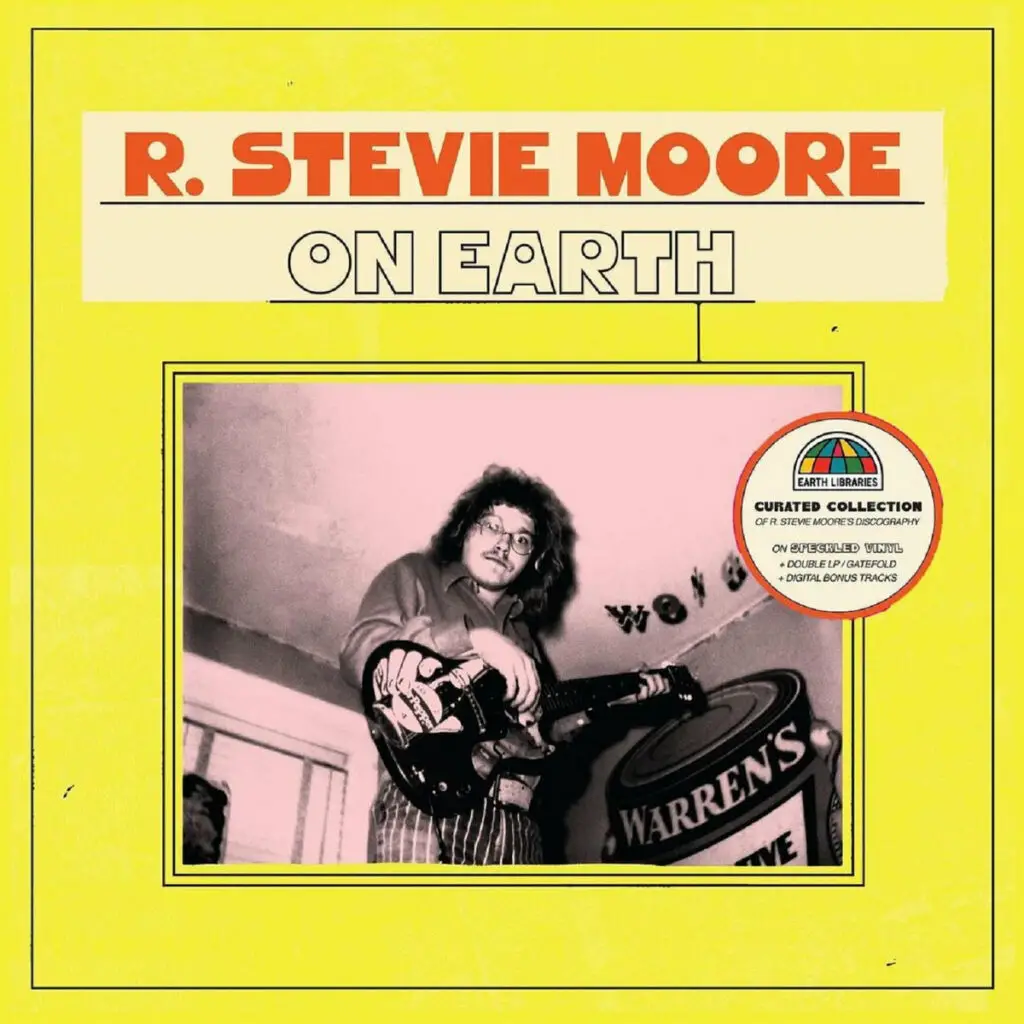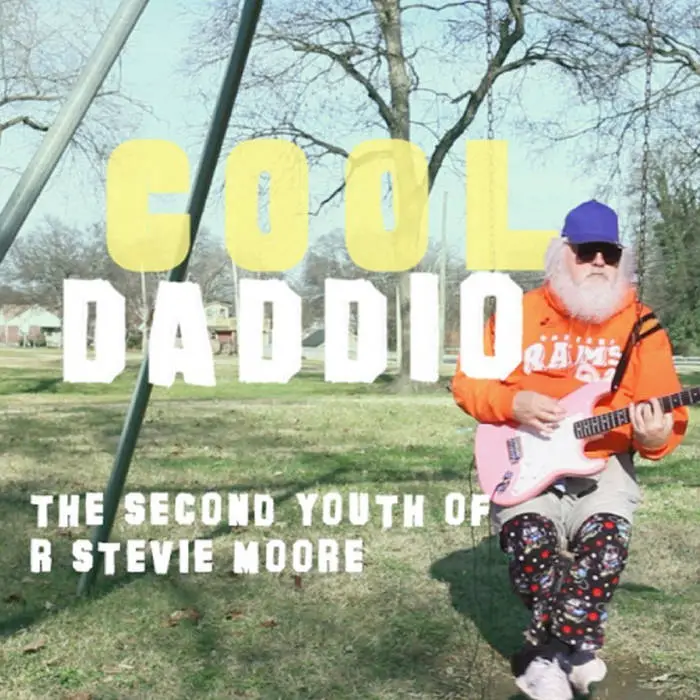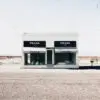R. Stevie Moore is an icon of the lo-fi music scene. His pioneering approach to DIY music production and his ability to make something out of nothing has inspired generations of musicians. He has released over 400 home-recorded albums since 1968, with a style that blends elements of rock, pop, country, and experimental music into something truly unique. Although he never achieved mainstream success, his influence on music cannot be overstated.
His DIY approach and eclectic sound helped to redefine the boundaries of what is possible in the recording studio, paving the way for countless other musicians to create their own unique sonic worlds. R. Stevie Moore is a true innovator whose work continues to inspire those with a passion for self-expression through music.
As the Earth Libraries site notes, to some he’s the godfather, to others, he’s the king. Before bedroom recording became an aesthetic choice, R. Stevie Moore built a legend of pop experimentalism, home recording, and mystic curmudgeonly. He is the archetype DIY musician, challenging convention and inspiring a new spectrum of sound with no limits. If you want to know what lo-fi can do, R Stevie Moore did it first.
His vast discography has been described as an encyclopedia of sound that will always keep us guessing. Whether you’re looking for something totally uncategorizable or just an excellent old-fashioned tune, R. Stevie Moore has something for everyone. A true pioneer in music and an inspiration to all who seek to defy musical conventions, R. Stevie Moore deserves recognition as one of the most influential artists of our time.
It All Started Way Back in the ’60s
To his parents known as Robert Steven Moore (born January 18, 1952), he received a four-track reel-to-reel tape deck and began recording as a one-man band in his parents’ basement in suburban Madison, Tennessee. His early albums’ innovative manipulation of low-fidelity recording processes defined his general aesthetic. His father, Bob Moore (1932 – 2021), was a session musician associated with the Nashville A-Team conglomerate who worked as a bassist for Elvis Presley, Jerry Lee Lewis, and Bob Dylan.
Actually, Steven made his commercial recording debut singing a duet with country recording artist Jim Reeves, “But You Love Me, Daddy”. The novelty song was withheld from commercial release until 1969 when it became a hit single in the UK on the RCA Victor label.
Talking about his early inspirations, Moore said that he found particular inspiration from albums that are “just all over the map … Zappa leaned into parody, and I’m all about that. I love humor.” It is a characteristic of his music until this day.
Going ‘Official’
Throughout the early 1970s, Moore continued to play local shows with a group of high-school friends whose band name changed frequently. His music tastes — which mainly encompassed artists like the Beach Boys, the Move, Frank Zappa, and Todd Rundgren — were mostly out of step with the prevailing music culture in Nashville.
Up until 1976, he continued with home recordings, when, with the help of Henry Lewy, a bigger-name producer who had worked with Joni Mitchell and the Grateful Dead, he recorded his most accessible album yet, Phonography, his first release on an ‘official’ label.
It was around this time that R. Stevie Moore’s reputation as an innovator began to grow and he became entrenched in the lo-fi music scene. He released albums on his own record label, Teenage Spectacular Records, and began to collaborate with other musicians.

From 1978 until 2010, Moore lived and recorded in his apartment studios in northern New Jersey. He was also a WFMU staff member for a number of years. In 1982, he launched the R. Stevie Moore Cassette Club, his home-based mailing service. It allowed fans to order cassettes of his music directly from him.
It was the time when Moore started releasing music as on a conveyor belt. “People tell me I’m shooting myself in the foot, releasing so much — I’ve heard that for years. But I can’t help it. It’s who I am,” he noted.
Music critic Richie Unterberger, in an essay about the developing cassette culture, wrote that he subsequently became “one of the most famous” artists associated with the movement.
As noted elsewhere, between 1984 and 1988, the French label New Rose issued four of his albums on vinyl, starting with Everything You Always Wanted to Know About R. Stevie Moore (But Were Afraid to Ask). The album, a double-disc retrospective, proved briefly popular in France, with a single “Chantilly Lace” from the album becoming a minor sleeper hit there, and prompting Moore to undertake a promotional visit to the country. The remaining albums — Glad Music (1986), Teenage Spectacular (1987), and Warning: R. Stevie Moore (1988) — were mostly recorded using professional studios.
Into the ’90s and On
By the late 1990s, Moore’s influence had spread beyond the lo-fi scene, and he began to gain recognition from mainstream media outlets. By 1999, the cassette club had become the R. Stevie Moore CD-R Club (CDRSMCLUB), and in 2005, he reported that there were about 100 dedicated fans who bought his music on a monthly basis; “They love getting product directly from the artist. Around 70 percent are in the States and about 30 percent in [Europe] … Sometimes they’ll disappear, and then come back five years later.”
One of his more notable releases in the new century came in 2002, when he recorded an album with Half Japanese frontman Jad Fair, titled FairMoore, described as “a lovely, heartfelt effort that shows both in top form” by critic Dave Mandl, who wrote that it “brings together two fiercely original figures in the American music underground”, the album consisting of Fair reciting his poetry over Moore’s instrumental backing. The 2009 compilation Me Too, issued on Cherry Red Records, was annotated by Dave Gregory of XTC.

He has since collaborated with a variety of artists and even appeared on The Late Show with David Letterman in 2013. Particularly notable is his album Make It Be, recorded with former Jellyfish member Jason Falkner.
Moore relocated to Nashville in 2010 and established a new band with guitarist J.R. Thomason and embarked on his first-ever tours, including Europe. In 2019, Bar/None released Afterlife, a compilation of Moore tracks that were recorded at professional studios between 2006 and 2013. The album also features contributions from Ariel Pink, Jason Falkner, and Lane Steinberg. Most of the selections are remakes of decades-plus old songs. Moore said that the “final album playlist was purposefully kept safe, clean, and more hi-fi mainstream, without my usual quirky left turns and lo-fi inserts.” On December 31 of the same year, he issued a statement on his website purporting that he would offer “absolutely no further songwriting, recording, performing, traveling, [or] interviews.
Moore’s influence can now be heard in the work of many contemporary musicians, from Ariel Pink and Mac DeMarco to Father John Misty and King Gizzard & The Lizard Wizard. His pioneering approach to sound also paved the way for countless other DIY artists to build their own unique sonic landscapes. Despite his lack of mainstream success, R. Stevie Moore remains one of the most important figures in lo-fi music and DIY culture.
Moore’s legacy is that of an artist who never compromised on his artistic vision, choosing to pursue a career based on his own terms. His influence can be heard in the work of many contemporary artists, but more importantly, it has inspired generations of musicians to take control of their careers and create their own unique sound.




